THE Expropriation Bill, signed into law by President Cyril Ramaphosa on Thursday, appears to be heading for the courts — and the cabinet clearing house — after a furious reaction from the Democratic Alliance (DA) and trade union Solidarity.
Not only have the two threatened to go to court, but Public Works Minister Dean Macpherson, who is a DA deployee to Ramaphosa’s cabinet, took to social media on Friday to say that the policy of expropriation without compensation would not be implemented “under my watch”.
Land expropriation without compensation is one of the DA’s so-called red-line issues — like the Basic Education Laws Amendment (Bela) Act and the National Health Insurance — over which the party has stated it will not budge.
The Bela Act was referred to the cabinet clearing house amid similar threats of legal action and defiance from the DA and Basic Education Minister Siziwe Gwarube, before a compromise was reached and a process of implementation via regulations was agreed upon.
The Expropriation Bill, which was passed last year before the ANC lost its parliamentary majority, appears to be heading in the same direction as Bela.
In a statement last Thursday, the presidency said Ramaphosa had signed the Bill, which “aligns legislation on expropriation with the Constitution” by replacing the apartheid-era Expropriations Act, which was adopted in 1975.

The old Act predated the expropriation mechanism provided for in section 25(2) of the Constitution, which recognises expropriation as an essential tool for the state to acquire property for a public purpose, or in the public interest, subject to just and equitable compensation being paid.
The new Expropriation Bill outlines the conditions under which nil compensation can be declared as just and equitable; the process through which it can be conducted and the categories of land which can be expropriated.
Presidential spokesperson Vincent Magwenya said the Bill outlined how the process would work and on what basis expropriation could take place.
He said the expropriating body could not act “arbitrarily” or for any purpose other than public use or in the public interest — and was compelled to attempt to reach agreement with the owner on reasonable terms.
Magwenya said the law “provides for disputes to be referred for mediation or to appropriate courts”.
The DA said on Friday that it would approach the court to interdict the implementation of the Bill.
Spokesperson Willie Aucamp said the party reiterated its opposition to the Bill and was consulting its lawyers.
“While the DA recognises that the Constitution allows for acts of redress and restitution, including land reform, we have serious reservations about the procedure as well as important, substantive aspects of the Bill,” he said.
“We are in discussions with our legal team to formulate our case.”
Macpherson, in a social media post, said he would not implement the Bill, which he is meant to countersign in his ministerial capacity as part of the final process of promulgation and implementation.
“As minister of public works and infrastructure, there will be no expropriation of private property on my watch. The guarantee of property rights under section 25 of the Constitution is not up for debate and is not negotiable,” he said.
“In terms of the law, only ministers implement Acts and regulations. Anyone who claims to speak for the department is just giving an opinion,” he said.
DA leader John Steenhuisen is set to address the media on Saturday on the DA’s response to the signing of the Bill and “the ANC’s agenda to force into effect the National Health Insurance, and the impact which these have on the unity of the GNU”.

While those to the right of the ANC are pushing back at the Bill, so are a number of those parties who have positioned themselves as being to its left.
Both the uMkhonto weSizwe (MK) party and the Economic Freedom Fighters (EFF) — who did not vote for the Bill when it came before parliament — labelled it as a “legislative cop-out” by Ramaphosa.
The EFF said the Bill was an “absurdity” and “an attempt to fool our people” as the constitutional framework remained the same as long as section 25 of the Constitution was not changed.
“It will not assist in resolving the tragedy of land restitution in this country, which has hollowed out state coffers for compensation to white settlers who legitimately own our land,” the party said.
The EFF said the only way to deal with the issue was to amend section 25 of the Constitution in its entirety to allow for expropriation as a single piece of legislation could not override the Constitution.

Image: Antonio Muchave/TimesLive
The party said it would soon table its own legislative proposals in parliament as a means of addressing the land restitution crisis.
The ANC and its alliance partners — and other members of the government of national unity — have welcomed the signing of the Bill, saying that it was a necessary overhaul of the 1975 Expropriation Act drafted by the apartheid regime, which did not reflect the progressive values and transformation mandate of the 1996 Constitution.
Labour federation Cosatu said the new law gave the government additional capacity to accelerate land reform by using expropriation where necessary with full, partial or nil compensation, and prevented “a cash-strapped state being held to ransom by outlandish compensation demands”.
The clear conditions under which nil or partial compensation could be used were a protection from abuse by corrupt elements in the state, as was access to legal recourse for all parties, it said.
“The Act is sober and in line with the constitution and international norms. It provides a just and equitable balance and ensures the needs of workers and ordinary citizens are respected,” the federation said.
“We should not be swayed by opposition to transformation from hysterical fringe right-wing elements who stoke sensationalism on matters requiring calm sobriety.” — Mail & Guardian

